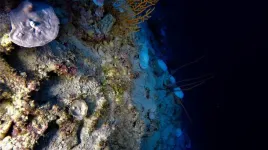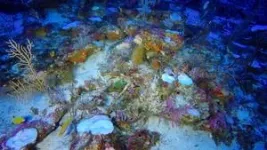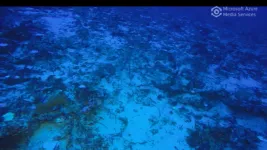(Press-News.org) Scientists have discovered the deepest known evidence of coral reef bleaching, more than 90 metres below the surface of the Indian Ocean.
The damage – attributed to a 30% rise in sea temperatures caused by the Indian Ocean dipole – harmed up to 80% of the reefs in certain parts of the seabed, at depths previously thought to be resilient to ocean warming.
However, scientists say it serves as a stark warning of the harm caused in our ocean by rising ocean temperatures, and also of the hidden damage being caused throughout the natural world as a result of climate change.
The findings, highlighted in a study published in Nature Communications, were discovered by researchers from the University of Plymouth.
Dr Phil Hosegood, Associate Professor in Physical Oceanography at the University of Plymouth and lead on the project, said: “There are no two ways about it, this is a huge surprise. Deeper corals had always been thought of as being resilient to ocean warming, because the waters they inhabit are cooler than at the surface and were believed to remain relatively stable. However, that is clearly not the case and – as a result – there are likely to be reefs at similar depths all over the world that are at threat from similar climatic changes.”
Researchers from the University have been studying the Central Indian Ocean for well over a decade, with their work supported by the Garfield Weston Foundation and the Bertarelli Foundation.
On their research cruises, they use a combination of in situ monitoring, underwater robots and satellite-generated oceanographic data to understand more about the region’s unique oceanography and the life it supports.
The first evidence of the coral damage was observed during a research cruise in November 2019, during which scientists were using remotely operated underwater vehicles equipped with cameras to monitor the coral health below the ocean surface.
Images from the underwater cameras were being transmitted live onto the research vessel, and gave the research team its first glimpse of the corals that had been bleached. Conversely, at the same time as the deeper reefs were bleaching, they observed shallow water reefs exhibiting no sign of harm.
Over the subsequent months, the researchers assessed a range of other data collected during the research cruise and information from satellites monitoring the ocean conditions and temperatures.
It highlighted that while temperatures on the ocean surface had barely changed during the period, temperatures beneath the surface had climbed from 22°C to 29°C due to the thermocline deepening across the equatorial Indian Ocean.
Clara Diaz, the lead author on the study, said: “What we have recorded categorically demonstrates that this bleaching was caused by a deepening of the thermocline. This is down to the regional equivalent of an El Nino, and due to climate change these cycles of variability are becoming amplified. Moving forward, bleaching in the deeper ocean here and elsewhere will likely become more regular.”
Dr Nicola Foster, Lecturer in Marine Biology and study co-author, added: “Our results demonstrate the vulnerability of mesophotic coral ecosystems to thermal stress and provide new evidence of the impact that climate change is having on every part of our ocean. Increased bleaching of mesophotic corals will ultimately lead to coral mortality and a reduction in the structural complexity of these reefs. This will likely result in a loss of biodiversity and a reduction in the critical ecosystem services that these reefs provide to our planet.”
Researchers from the University returned to the same areas during planned cruises in 2020 and 2022, and found that large parts of the reef had recovered.
In spite of this, they say, it is critically important to increase monitoring of the seafloor in the deep ocean, even if it is a hugely challenging and complicated undertaking.
With damage to shallow water corals increasing in frequency and severity, it had been expected that mesophotic corals – found between 30-150m under the surface – would plug the gap in terms of delivering ecosystem benefits.
However, this research highlights that may not be the case – and with deep water corals all over the planet remaining largely understudied, similarly damaging incidences of bleaching could be going unnoticed.
Dr Hosegood added: “The oceanography of a region is impacted by naturally occurring cycles that are becoming amplified by climate change. Currently, the region is suffering similar, if not worse, impacts due to the combined influence of El Nino and the Indian Ocean Dipole. While there is no way we can stop the thermocline from deepening, what we can do is expand our understanding of the impacts that these changes will have throughout these environments of which we have so little knowledge. In the face of fast-paced global change, that has never been more urgent.”
END
Scientists discover deepest known evidence of coral reef bleaching
2023-10-19
ELSE PRESS RELEASES FROM THIS DATE:
Holy bat skull! Fossil adds vital piece to bat evolution puzzle
2023-10-19
Of all the mammals, bats have one of the poorest fossil records, with palaeontologists estimating that about 80 per cent of it is missing.
This has made it difficult to pinpoint exactly when they first began to fly, or began roosting in caves, or developed their unique way of ‘seeing’ their surroundings in the dark using sound – called echolocation.
But a near-perfectly preserved bat’s skull discovered by French palaeontologists in a cave that dates back about 50 million years has shed new light on what we thought we knew about this ancient, ...
Rebates can offer solutions to California’s groundwater woes
2023-10-19
Many aquifers in California and around the world are being drained of their groundwater because of the combined impacts of excess pumping, shifts in land use, and climate change. However, a new study by scientists at UC Santa Cruz and UC Berkeley, published on Oct. 18 in Nature Water, may offer a solution. It describes the development and operation of a novel incentive program that uses water rebates to pay for some of the costs of getting stormwater runoff into the ground. The program is called recharge net metering (ReNeM).
Although ...
Study finds men's antidepressant use did not negatively impact IVF success
2023-10-19
In vitro fertilization (IVF) is a time-intensive and often stress-inducing fertility procedure. Yet how does that stress impact its success? Investigators at Brigham and Women’s Hospital, a founding member of the Mass General Brigham healthcare system, assessed the effects of anxiety and depression in men on fertility and IVF outcomes. Their findings reveal no correlation between anxiety, regardless of antidepressant use, on IVF outcomes or live birth rate. Results are published in Human Reproduction.
“Our findings indicate that despite past concerns over antidepressant medication’s ...
Regular health checkups may prevent the development of end-stage kidney disease (ESKD)
2023-10-19
Niigata, Japan - A new Japanese ecological study revealed that prefecture-specific participation rates for Specific Health Checkups (SHC participation rates) had significant negative effects on prefecture-specific standardized incidence rates (SIRs) of treated ESKD and prefecture-specific prevalence of chronic kidney disease (CKD). The findings support the importance of increasing SHC participation rates at the population level and encouraging people to undergo regular health checkups.
"Japan has one of the highest incidence and ...
Eyes may be the window to your soul, but the tongue mirrors your health
2023-10-19
A 2000-year-old practice by Chinese herbalists – examining the human tongue for signs of disease – is now being embraced by computer scientists using machine learning and artificial intelligence.
Tongue diagnostic systems are fast gaining traction due to an increase in remote health monitoring worldwide, and a study by Iraqi and Australian researchers provides more evidence of the increasing accuracy of this technology to detect disease.
Engineers from Middle Technical University (MTU) in Baghdad and the University of South Australia (UniSA) used a USB web camera and computer to capture tongue ...
CHIPS and Science Act spurs NanoFab cleanroom ribbon cutting at NYU Tandon School of Engineering
2023-10-19
NYU leadership - including recently inaugurated President Linda Mills and NYU Tandon School of Engineering Dean Jelena Kovačević - joined University faculty and partners on October 18th to cut the ribbon at the newly-minted NYU Nanofabrication (NanoFab) Cleanroom, a specialized research environment in which scientists and engineers can fabricate cutting-edge semiconductor chips to advance research on quantum science and engineering, precision medicine, neurotechnologies, next-generation communications technology and secure computing.
Located on NYU Tandon’s ...
New study sheds light on long term effectiveness and safety of two widely used statins
2023-10-19
Two widely used statins, rosuvastatin and atorvastatin, are equally effective at preventing heart attacks, strokes and death in people with coronary artery disease. But while rosuvastatin treatment is associated with lower cholesterol levels, it also carries a higher risk of developing type 2 diabetes than atorvastatin, finds a study published by The BMJ today.
Lowering “bad” (LDL) cholesterol levels with statins is recommended for people with coronary artery disease - a condition where the blood vessels supplying the heart are ...
Surgery more effective than nasal sprays for symptoms of a crooked septum
2023-10-19
Surgery to straighten a crooked septum (the thin wall of bone and cartilage dividing the space between the two nostrils) is more effective than nasal sprays, and should be offered to adults with at least moderate symptoms such as breathing disruption, suggests a UK trial published by The BMJ today.
A crooked (deviated) septum often means that one nasal passage is narrower than the other, making it feel blocked, which can affect breathing, sleep or exercising.
Surgery to correct this (septoplasty) is a common operation. In 2019-20, 16,700 septoplasties were carried ...
Biodegradable plastics still damaging to fish – Otago study
2023-10-19
Biodegradable plastics may not be the solution to plastic pollution many hoped for, with a University of Otago study showing they are still harmful to fish.
Petroleum-derived microplastics are known to impact marine life, but little is known about the impact of biodegradable alternatives.
The study, published in Science of the Total Environment and funded by a University of Otago Research Grant, is the first to assess the impact petroleum-derived plastic and biodegradable plastic have on wild fish.
Lead author Ashleigh Hawke, who completed a Master of Science in Otago’s Department of Marine Science, ...
Groundbreaking journal AI in Precision Oncology publishes preview content
2023-10-19
The fusion of artificial intelligence (AI)-enabled technologies and precision oncology is advancing at an unprecedented pace, and the introduction of the new peer-reviewed journal, AI in Precision Oncology, will support clinicians, researchers, AI experts, patients, and industry leaders with up-to-date advancements in the field while fostering an environment conducive to further innovation and collaboration. A preview issue of the journal is now available. Click here to read the issue now.
“At the heart of my vision for this journal is the ...





